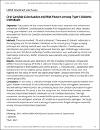Oral Candida Colonization and Risk Factors Among Type-II Diabetic Individuals IADR Abstract Archives
| Author | Alkhabuli, Jumma |
| Available date | 2022-01-30T07:27:21Z |
| Publication Date | 2021-07-22 |
| Publication Name | IADR Abstract Archives |
| Abstract | Oral Candida Colonization and Risk Factors Among Type-II DiabeticIndividuals Objectives : The purpose of this cross-sectional study was to ascertain and compare theprevalence of diff erent Candida species isolated from tongue dorsa and saliva samplesamong type-II diabetic and non-diabetic individuals from Ras-Al-Khaimah. Furthermore,associated risk factors for Candida colonization and their biofi lm production ability werealso studied. Methods : The study involved 126 adult individuals. There were 63 diabetic individuals inthe test group and 63 non-diabetic individuals in the control group. Tongue scrapingtechnique and spitting method were used for sample collection. Candida speciesidentifi cation was performed using Sabouraud Dextrose agar, CHROM agar culture andgerm tube test. Risk factors aff ecting Candida colonization were evaluated by clinical oralexamination and survey. Biofi lm production was assessed using crystal-violet microtiterplate method. Results: Candida species were detected in (39.7%) of diabetic individuals compared to(20%) in the control group (P<0.05). C. albicans followed by C. glabrata were the mostprevalent species in both diabetic and control groups. C.tropicalis and C.parapsilosis were isolated only from the diabetic group. Diabetic individuals with dry mouth, poor oralhygiene and low saliva pH levels had signifi cantly higher Candida colonization (P<0.05).Increased biofi lm production was observed in the diabetic group (40%) as compared to thecontrol group (23%). Conclusions: In our study, C. albicans emerged as the most prevalent species isolated fromtype-II diabetic individuals in Ras-Al-Khaimah population. Poor oral hygiene, xerostomiaand low saliva pH were found to be contributing factors for Candida colonization in type-IIdiabetic individuals. The study is the fi rst study from the United Arab Emirates to screenimmunocompromised diabetic individuals for oral Candida colonization. The highprevalence rate along with the increased biofi lm production among diabetic individualsestablishes the pathogenic potential of Candida as an opportunistic pathogen. Our studyreiterates the importance of oral screening of opportunistic fungal pathogens especiallyamong immunocompromised population. Division: Meeting: 2021 IADR/AADR/CADR General Session (Virtual Experience) Location: Year: 2021 |
| Sponsor | RAK College off Dental Sciences, UAE |
| Language | en |
| Publisher | College off Dental Sciences, UAE |
| Subject | candida diabetes xerostomia |
| Type | Presentation |
Files in this item
This item appears in the following Collection(s)
-
Dental Medicine Research [261 items ]


